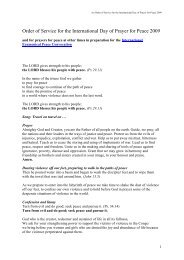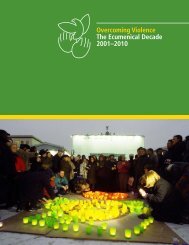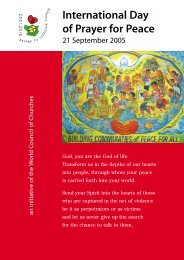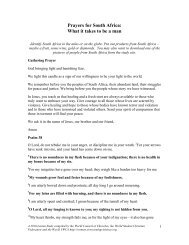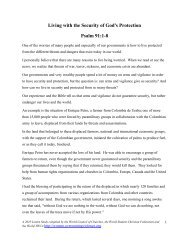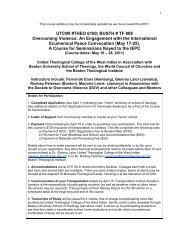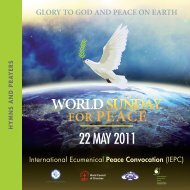Alternative Globalization Addressing Peoples and Earth
Alternative Globalization Addressing Peoples and Earth
Alternative Globalization Addressing Peoples and Earth
You also want an ePaper? Increase the reach of your titles
YUMPU automatically turns print PDFs into web optimized ePapers that Google loves.
53<br />
globalization, <strong>and</strong> the commitment to transform the system:<br />
“We reject the current world economic order imposed by global neoliberal<br />
capitalism <strong>and</strong> any other economic system, including absolute<br />
planned economies, which defy God’s covenant by excluding the poor,<br />
the vulnerable <strong>and</strong> the whole of creation from the fullness of life. We<br />
reject any claim of economic, political, <strong>and</strong> military empire which<br />
subverts God’s sovereignty over life <strong>and</strong> acts contrary to God’s just<br />
rule.”<br />
After the critique of economic globalization, the delegates underlined<br />
the need to covenant in justice with God:<br />
“On this common journey, some churches have already expressed<br />
their commitment in a confession of faith. We urge them to continue<br />
to translate this confession into concrete actions both regionally <strong>and</strong><br />
locally. Other churches have already begun to engage in this process,<br />
including taking actions, <strong>and</strong> we urge them to engage further, through<br />
education, confession <strong>and</strong> action. To those other churches, which<br />
are still in the process of recognition, we urge them on the basis of<br />
our mutual covenanting accountability, to deepen their education<br />
<strong>and</strong> move forward towards confession.”<br />
The Accra declaration will remain a very critical challenge to churches<br />
for years to come.<br />
WCC / World Bank <strong>and</strong> IMF encounters 2002-2003<br />
Following a request from the Bretton Woods institutions, three external<br />
encounters with these institutions, <strong>and</strong> one internal encounter with<br />
churches <strong>and</strong> specialized ministries were organized in 2002 <strong>and</strong> 2003. The<br />
request had come in response to a WCC background document entitled<br />
“Lead us not into temptation: churches’ response to the policies of<br />
international finance institutions. During the encounters, the WCC<br />
emphasized that poverty eradication can be achieved only by addressing<br />
injustice <strong>and</strong> inequality, the roots of which lie in the present unjust<br />
economic order.<br />
A final paper on “Common ground <strong>and</strong> differences” <strong>and</strong> a joint statement<br />
issued at a high-level encounter in November 2003 with the president of<br />
the World Bank <strong>and</strong> the deputy managing director of IMF indicate that<br />
the WB/IMF will not shift from the concept of growth as the panacea to<br />
alleviate poverty. They claim that they are not m<strong>and</strong>ated to promote human




